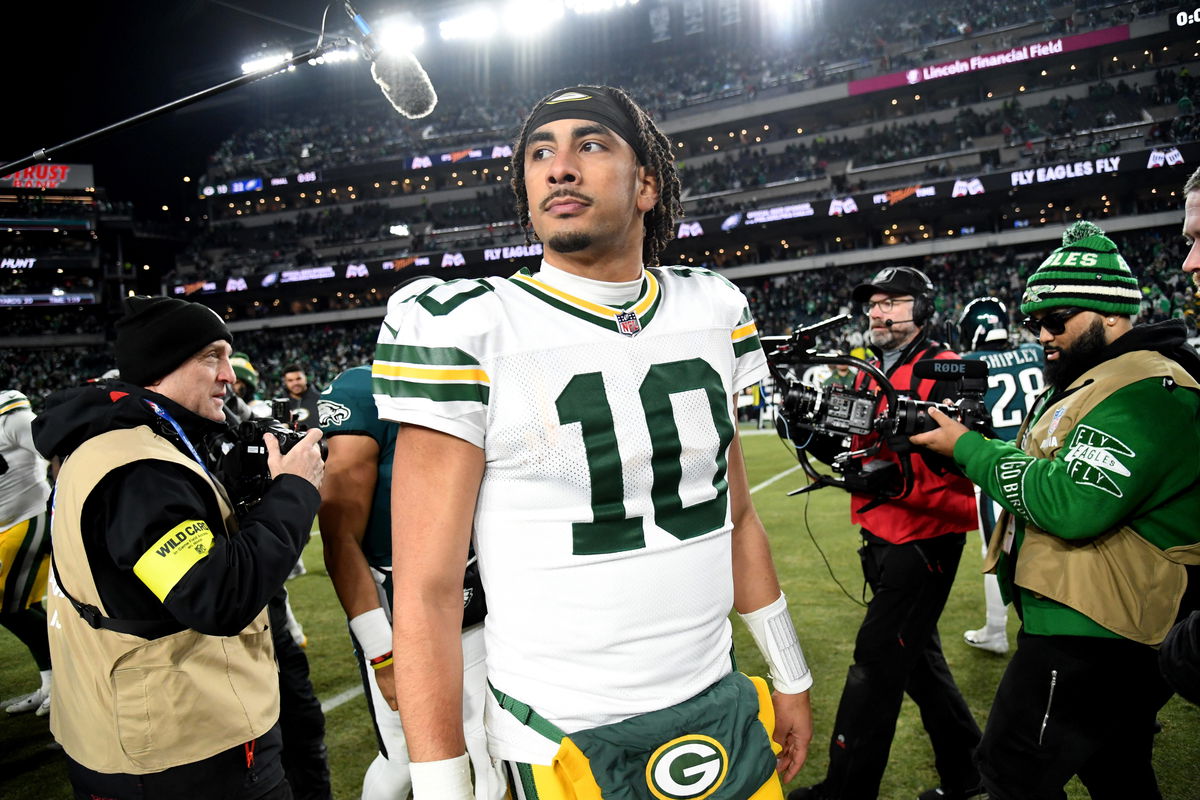
Imago
NFL, American Football Herren, USA NFC Wild Card Round-Green Bay Packers at Philadelphia Eagles Jan 12, 2025 Philadelphia, Pennsylvania, USA Green Bay Packers quarterback Jordan Love 10 on the field after loss to the Philadelphia Eagles in an NFC wild card game at Lincoln Financial Field. Philadelphia Lincoln Financial Field Pennsylvania USA, EDITORIAL USE ONLY PUBLICATIONxINxGERxSUIxAUTxONLY Copyright: xEricxHartlinex 20250112_eh_se7_01507

Imago
NFL, American Football Herren, USA NFC Wild Card Round-Green Bay Packers at Philadelphia Eagles Jan 12, 2025 Philadelphia, Pennsylvania, USA Green Bay Packers quarterback Jordan Love 10 on the field after loss to the Philadelphia Eagles in an NFC wild card game at Lincoln Financial Field. Philadelphia Lincoln Financial Field Pennsylvania USA, EDITORIAL USE ONLY PUBLICATIONxINxGERxSUIxAUTxONLY Copyright: xEricxHartlinex 20250112_eh_se7_01507

Imago
NFL, American Football Herren, USA NFC Wild Card Round-Green Bay Packers at Philadelphia Eagles Jan 12, 2025 Philadelphia, Pennsylvania, USA Green Bay Packers quarterback Jordan Love 10 on the field after loss to the Philadelphia Eagles in an NFC wild card game at Lincoln Financial Field. Philadelphia Lincoln Financial Field Pennsylvania USA, EDITORIAL USE ONLY PUBLICATIONxINxGERxSUIxAUTxONLY Copyright: xEricxHartlinex 20250112_eh_se7_01507

Imago
NFL, American Football Herren, USA NFC Wild Card Round-Green Bay Packers at Philadelphia Eagles Jan 12, 2025 Philadelphia, Pennsylvania, USA Green Bay Packers quarterback Jordan Love 10 on the field after loss to the Philadelphia Eagles in an NFC wild card game at Lincoln Financial Field. Philadelphia Lincoln Financial Field Pennsylvania USA, EDITORIAL USE ONLY PUBLICATIONxINxGERxSUIxAUTxONLY Copyright: xEricxHartlinex 20250112_eh_se7_01507
Monday night’s matchup between the Philadelphia Eagles and the Green Bay Packers has placed officiating in the harsh spotlight once more. Several uncalled false starts through the contest, most notably in the case of the Eagles’ vaunted “tush push” saw fans fuming. What began as another hard-fought NFC matchup soon turned into a chaos of unfair advantage.
Watch What’s Trending Now!
It took one Eagles drive for the controversy to start. On their first tush push attempt, Philadelphia lined up for a short-yardage conversion . As quarterback Jalen Hurts crouched under center, both guards visibly came forward before the line of scrimmage. And yet, no flag was thrown. The Eagles converted the third-and-one with ease.
Luckily for Green Bay, that early mistake didn’t cost points immediately, Hurts fumbled later in the drive. But the tone had already been set. Just minutes later, officials missed another false start, this time on Jordan Love‘s traditional quarterback sneak on Green Bay’s first drive. As the Packers lined up on fourth-and-one, both the left tackle and left guard appeared to flinch early, but once again, no whistle came.

Imago
Credits: IMAGO
The whole sequence underscored what many players and coaches have been saying all season, the officiating around short-yardage formations has become wildly inconsistent. On one hand, the Eagles’ linemen seem to get a half-step advantage on nearly every tush push attempt without penalty.
On the other, teams like Green Bay and others have been flagged for far less. The irony, of course, came full circle when the officials finally threw a flag, not on an obvious early jump, but on Eagles tackle Jordan Mailata, who flinched and stepped forward because he thought a Packers defender had moved. Only then did the officials seem to find their whistles.
The Eagles have turned the tush push or “Brotherly Shove,” into a cheat code. They’ve ridden it to Super Bowl contention, with their linemen’s low pad level and Hurts’ powerful legs combining to make it nearly automatic in third-and-short or goal-line situations.
Earlier this year, the Packers proposed a rule change to ban the play, arguing it provides an unfair advantage. While 22 of the 32 teams voted in favor, the measure fell short of the three-fourths majority needed to pass. For now, the play remains legal, and, as Monday proved, still controversial.
Fans Erupt over officiating double standard
Social media quickly blew up with fans calling out the apparent bias: “Callin us for false start but not the eagles who do it every play,” one frustrated Packers supporter posted.
Another wrote, “They just called false start on the packers on the tush push 😂 but not on the eagles 🤣 what a joke.” Countless others echoed the sentiment, accusing referees of turning a blind eye to Philadelphia’s early movements while nitpicking similar plays by other teams.
The backlash captured a growing frustration across the NFL landscape. ”Exactly, don’t call eagles insane false start but call that instead lol,” one fan quipped on X. For many, it wasn’t just about a single missed call; it was about a perceived pattern of officiating favoritism toward certain teams or styles of play.
The Eagles’ dominance in short-yardage scenarios has become a weekly talking point, but when those plays come with visible movement before the snap, and no consequences, fans feel justified in questioning fairness.
Even neutral observers weighed in, questioning how a play that seems to break the most fundamental timing of the snap keeps going uncalled. ”so refs can finally see a false start?” another one wrote. As the dust settles, the legality of the tush push and officiating consistency only become more hotly debated.
.png)
.png)
.png)





